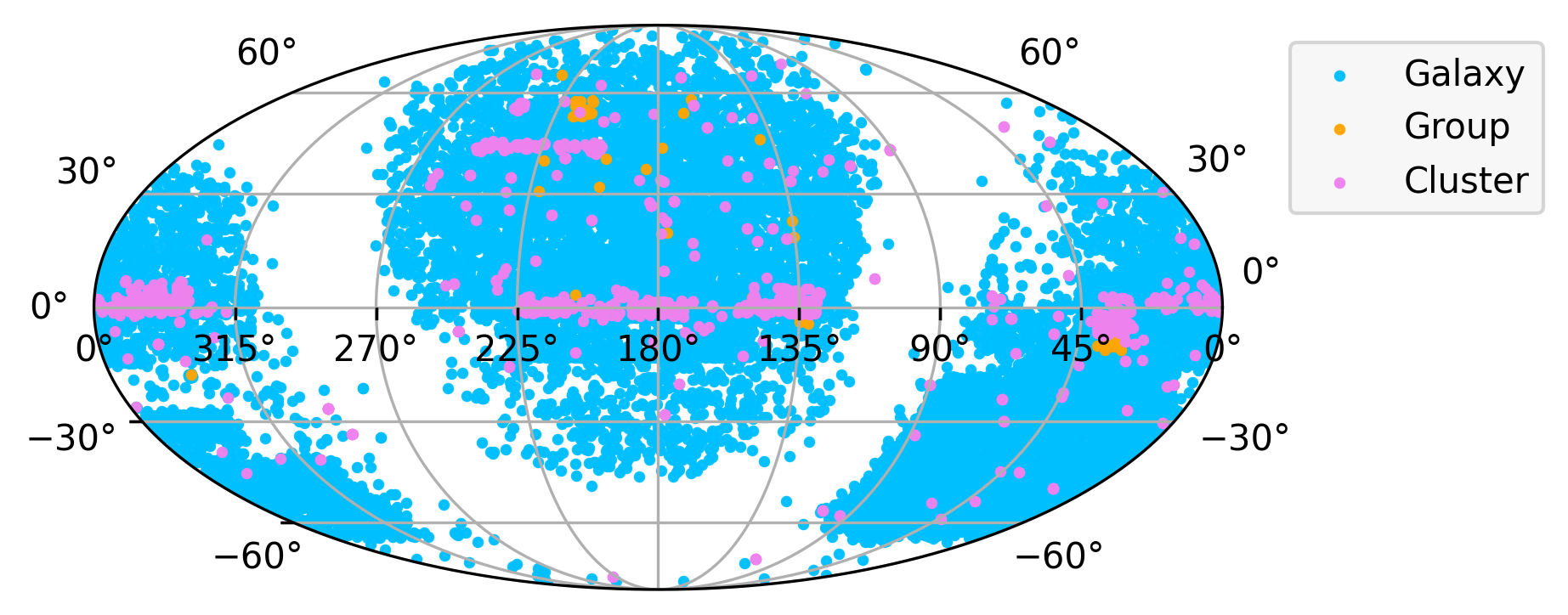A public and community-maintained catalog of known strong gravitational lenses
Project description
$\texttt{lenscat}$
A public and community-contributed catalog of known strong gravitational lenses.
Quickstart
The catalog is available as a plain csv file under lenscat/data/catalog.csv. Alternatively, one can interact with the catalog using a web app (mobile-friendly).
We also provide a python package lenscat, available in pypi. Simply do
pip install lenscat
to install the latest version. Here we adopt the continuous deployment paradigm (similar to astroquery). Whenever there is a change in the catalog content, or a major change in the code, a new release will be available instantaneously on both GitHub and PyPI.
The code converts the catalog in the csv file into a custom Catalog object that is inherited from the Table object in astropy. To access the catalog, simply run
In [1]: import lenscat; lenscat.catalog
Out[1]:
<Catalog length=4587>
name RA DEC zlens type grading
deg deg
str20 float64 float64 str15 str7 str9
------------- ---------- -------- -------- ------- ---------
J0011-0845 2.83435 -8.7643 - galaxy confirmed
J0013+5119 3.348077 51.3183 - galaxy confirmed
PSJ0028+0631 7.09369 6.5317 - galaxy confirmed
PSJ0030-1525 7.5636 -15.4177 measured galaxy confirmed
J0047+2514 11.9465943 25.2411 - galaxy confirmed
HE0047-1756 12.6158 -17.6693 0.407 galaxy confirmed
... ... ... ... ... ...
235614+023115 359.05923 2.52107 0.372 galaxy probable
235730+010133 359.377643 1.02596 0.638 galaxy probable
235811+003309 359.5475 0.5527 0.639 cluster probable
235853+012406 359.721708 1.401816 0.481 galaxy probable
235933+020823 359.8897 2.1398 0.43 cluster confirmed
235948-005913 359.95245 -0.98702 0.758 galaxy probable
235952+004154 359.9698 0.6985 0.267 cluster probable
Note that the code will try to assign the unit for each of the columns inferred from its name, and that it will hide the 'ref' column by default. One can show or hide the 'ref' column by calling .show_ref() and .hide_ref() on the Catalog object respectively.
Every Catalog object supports two features: basic searching with .search() and crossmatching with a skymap with .crossmatch(). Note that these function will return a Catalog object, and hence they can be composed together (e.g., .crossmatch().search()).
Basic searching
This feature is implemented as .search(). One can search/filter by any combination of
- ranges of right ascension (specified as
RA_range=(RA_min, RA_max)) - ranges of declination (specified as
DEC_range=(DEC_min, DEC_max)) - ranges of lens redshift if available (specified as
zlens_range=(zlens_min, zlens_max)) - type of the lenses (specified as
lens_type) - grading of the lenses (specified as
grading)
For example, to get a list of the cluster-scale lenses which are confirmed and with a redshift $z_{\mathrm{lens}} \geq 1$ together with the reference, run
In [1]: import lenscat, numpy; lenscat.catalog.search(grading="confirmed", lens_type="cluster", zlens_range=(1,numpy.inf)).show_ref()
Out[1]:
<Catalog length=3>
name RA DEC zlens type grading ref
deg deg
str20 float64 float64 str15 str7 str9 str171
------------- --------- --------- ----- ------- --------- ------------------------------------------------------------------
021118-042729 32.827087 -4.458069 1.02 cluster confirmed https://arxiv.org/abs/2004.00634 More et al. 2012 More et al. 2016
023100-062139 37.7516 -6.3608 1.17 cluster confirmed https://arxiv.org/abs/2002.01611
220859+020655 332.2495 2.1153 1.04 cluster confirmed https://arxiv.org/abs/2002.01611
Crossmatching with a skymap
This feature is implemented as .crossmatch(). This function is simply a wrapper to the crossmatch() function in ligo.skymap which performs the cross-matching of a gravitational-wave (GW) skymap with a given list of coordinates. For example, to cross-match the GW skymap of GW190814 (download from here) with only the confirmed lenses in the lenscat catalog, simply run
In [1]: import lenscat; lenscat.catalog.search(grading="confirmed").crossmatch("GW190814_PublicationSamples.multiorder.fits")
Out[1]:
<Catalog length=761>
name RA DEC zlens type grading searched probability searched area
deg deg deg2
str20 float64 float64 str15 str7 str9 float64 float64
------------------ ----------- ------------ -------- ------- --------- -------------------- ------------------
MACSJ0035.4-2015 8.85 -20.27083333 0.352 cluster confirmed 0.9881400284668479 46.21360633943737
0047-281 12.42458333 -27.87380556 0.484 galaxy confirmed 0.9899384024067811 48.32495441567177
A2813 10.8625 -20.61694444 0.2924 cluster confirmed 0.9924501903529119 51.82638259178721
DESJ0145-3541 26.44493 -35.69093 0.49 galaxy confirmed 0.9998766459538251 82.04095381939021
DESJ0138-2844 24.59567 -28.73555 0.44 galaxy confirmed 0.9999999999999968 151.91214978321142
DESJ0130-3744 22.51201 -37.74938 0.68 galaxy confirmed 0.9999999999999968 173.7862404115262
AGEL 014253-183116 10.72041667 -18.52105556 0.63627 galaxy confirmed 0.9999999999999968 187.58212970468517
Format
['name'] = Names of galaxies/galaxy clusters
['RA [deg]'] = RA in dergees
['DEC [deg]'] = DEC in degrees
['zlens'] = Lens redshift (if known)
['type'] = Type of lens (i.e. galaxy or galaxy cluster)
['grading'] = Grading whether it is a confirmed lens or a probable lens (see individual references for internal grading systems)
['ref'] = Reference to the corresponding catalog or study
References
This catalog contains the known strong lenses from the following studies:
-
GLQ Database: https://research.ast.cam.ac.uk/lensedquasars/index.html
-
CLASH (Postman+2012): https://archive.stsci.edu/prepds/clash/
-
MUSES Cluster Followups (Richards+2020): https://cral-perso.univ-lyon1.fr/labo/perso/johan.richard/MUSE_data_release/
-
37 Clusters from SDSS Giant Arcs Survey https://iopscience.iop.org/article/10.3847/1538-4365/ab5f13
-
An Extended Catalog of Galaxy–Galaxy Strong Gravitational Lenses Discovered in DES Using Convolutional Neural Networks https://iopscience.iop.org/article/10.3847/1538-4365/ab26b6#apjsab26b6t5
-
The AGEL Survey: Spectroscopic Confirmation of Strong Gravitational Lenses in the DES and DECaLS Fields Selected Using Convolutional Neural Networks https://arxiv.org/ftp/arxiv/papers/2205/2205.05307.pdf
-
LSD Survey https://web.physics.ucsb.edu/~tt/LSD/
-
(COSMOS) LensFlow: A Convolutional Neural Network in Search of Strong Gravitational Lenses https://ui.adsabs.harvard.edu/abs/2018ApJ...856...68P/abstract
-
SLACS. XIII. Galaxy-scale strong lens candidates https://ui.adsabs.harvard.edu/abs/2019yCat..18510048S/abstract
-
RINGFINDER: Automated Detection of Galaxy-scale Gravitational Lenses in Ground-based Multi-filter Imaging Data https://iopscience.iop.org/article/10.1088/0004-637X/785/2/144
-
Survey of Gravitationally-lensed Objects in HSC Imaging (SuGOHI) Candidate List https://www-utap.phys.s.u-tokyo.ac.jp/~oguri/sugohi/
See also
Acknowledgements
This project was supported by the research grant no. VIL37766 and no. VIL53101 from Villum Fonden, and the DNRF Chair program grant no. DNRF162 by the Danish National Research Foundation.
This project has received funding from the European Union's Horizon 2020 research and innovation programme under the Marie Sklodowska-Curie grant agreement No 101131233.
We would also like to thank Jonah Kanner for introducing us the amazing streamlit service that hosts the web app for lenscat.
Project details
Release history Release notifications | RSS feed
Download files
Download the file for your platform. If you're not sure which to choose, learn more about installing packages.
















